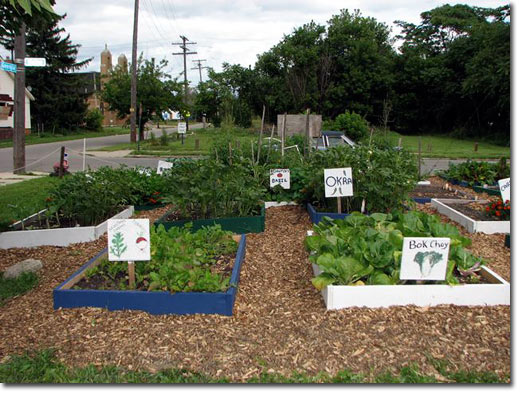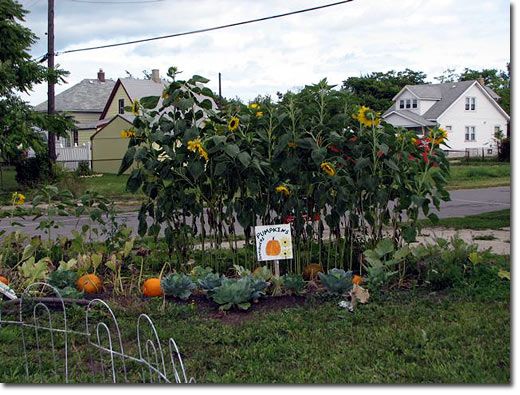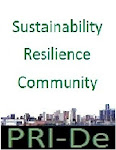
Detroit: time to turn the problem into the solution |
Permaculture in Detroit seems like a bit of an oxymoron, but urban agriculture is blooming all over the city. From the city-wide efforts of The Greening of Detroit in educating people on gardening techniques to the smaller-scale efforts of individuals such as Kate Devlin and her Spirit of Hope garden to groups such as the Detroit Black Community Food Security Network and their 2-acre D-Town Farm and the Georgia Street Community Gardens/Collective, community gardens are being sown on vacant lots dotting this city of nearly a million, filling the holes left by the loss of nearly half its peak auto industry-driven population. Photos of the streets of Detroit from eras long past and rusted nearly away show tightly packed, neat homes. Today, half those homes have devolved into ruins or grassy, often debris-filled, lots. Estimates on the number of lots range from 60,000 to 80,000. Those numbers don’t include the many parks now being left largely untended by the city government.
This devastation didn’t come suddenly, but slowly, and as surely, as Katrina, but with more destruction. When the auto industry left town, they left a city. When they left their factories, they left the people. When they left, they started a slow cataclysm. New Orleans lost a couple hundred thousand people. Detroit has lost nearly a million – a slow-motion tidal wave of economic destruction. Unemployment is, and has been, far above the national average for a long time. There are no major chain grocery stores or warehouse-style stores within the city limits of Detroit, making the city a virtual food desert. Residents must either pay exorbitant prices for inferior food or travel out of the city to get decent prices and (somewhat) nutritious food. The best efforts of those building community gardens throughout the city still is but a brief shower in this desert compared to the wasteland that is this once-thriving city.
But what remains is a perfect template for rebirth: water, land, idle hands and a food desert. Detroit has the potential to become the first truly major American city that can provide a large majority of its own food, and in a way that protects the environment while reducing carbon emissions. It’s estimated that Victory Gardens provided up to 40% of all vegetables during World War II. With well-organized, intensive gardening, we can easily exceed that number. If ever Permaculture principles are to be applied on a massive scale, at a grassroots level, this is the place and this is the time.
But Detroit is not an easy city. She is wary. Many feel they have paid their dues here and look on strangers with suspicion. Long-term residents are often jaded beyond reaching. They’ve been left for dead, fooled time after time by big talk and little or no action. Consider Detroit the Show Me city. It’s not easy to come here with an idea or a plan and expect others to accept you. They won’t, by-and-large, even if they like the plan and see a buck or two hanging out of your pocket. They’ve seen both before. Of course, very few have ever heard of Permaculture, much less understand what it is. This can even be true among the “green” movement as one person said to me, “Permaculture isn’t the be-all and end-all” of agriculture. They were right. As you likely know if you are reading this, Permaculture doesn’t mean permanent agriculture, it means permanent culture. It’s not a system of agriculture, but of system design. It’s a way of designing our homes and communities so they can be sustainable and resilient. Food just happens to be a very important part of continuing to live and necessarily gets a lot of attention from anyone wanting to be self-reliant, eco-friendly, and eat fresh, healthy food grown in harmony with the rest of Nature.
 Permaculture gardens in Detroit
Permaculture gardens in DetroitDetroit needs a new permanent culture to replace the car culture that has abandoned it. Detroit has a plan in place to reorganize the city, but it is anything but harmonious with nature despite providing a lot of green space. Detroit is a very large city by area. The city plan outlines areas of the city large enough to be small cities themselves as areas for (re)development with large areas of green space surrounding them. Any permaculturist will recognize the folly of this as being nothing more than how cities have always been: pack the people together for efficiency and ship everything in. We’d rather see small, walkable, self-reliant communities built along primary thoroughfares that are both enclosed by green space and with each home(stead) having enough space immediately around it to grow at least their primary kitchen vegetables, perhaps connected by light rail, trolleys or other electrically powered mass transit system.
The Permaculture and Resilience Initiative – Detroit (PRI-De) will work with others to make Permaculture an important part of the rebirth of the Motor City as the Motor of Urban Agriculture. PRI-De will be offering PDC’s with a strong urban component in recognition of the great need for urban populations to redesign their access to food and energy within the context of an uncertain future. We will be applying the funds from paying students to provide Permaculture training to local residents on a scholarship basis. We will also expand into workshops that highlight green tech and sustainability.
 Recession or not, people can provide for their own needs
Recession or not, people can provide for their own needsOver time, we hope to have a staff that is virtually all local residents with some, if not all, trained at PRI-De. It is our hope these graduates will be active in creating Permaculture-based homesteads for themselves to demonstrate the value of their training, that they will be active in their neighborhoods helping their families, friends and neighbors to feed themselves, that they will be active in working for food justice and that they will help design a truly sustainable Detroit.



